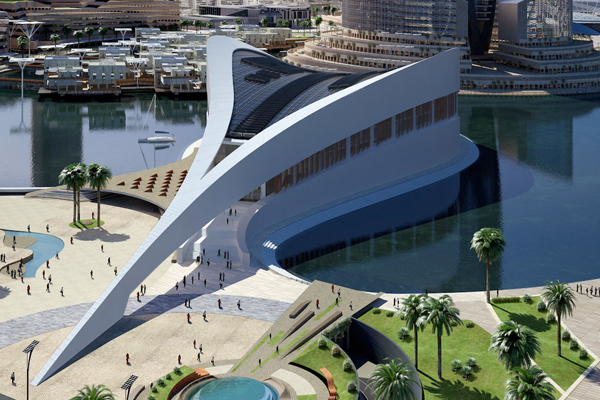Q&A with Amir Mousawi, Director of AMBS Architects
Amir Mousawi will be in conversation with Marcos De Andres and Edwin Heathcote at The Mosaic Rooms on Thursday 6 February, 7pm. They will discuss the importance of the designs for the New Baghdad Library, the challenges facing them, as well as the implications of the building in establishing a new platform for Iraq’s cultural future. More information.
Q1/ Can you briefly introduce yourself and tell us a bit about your work at AMBS architects?
AMBS Architects was founded in 1996 by my father Ali Mousawi and 2006 was joined by Marcos De Andres and myself. Working together has allowed us to take on more ambitious, high profile projects like the Baghdad Library and the project management of the Basra Sports City. We now have a great team of 60 employees in London, Baghdad and Basra. We are involved in every stage of the architectural process, guiding and overseeing the design teams from initial conception to design completion and project management.
Before this I worked as a project architect in northern Iraq, before setting up a London-based design practice with Marcos De Andres. Marcos studied at the Bartlett School of Architecture and has previously worked with Fosters and Partners, Make and Californian practice Morphosis, while Ali has over forty years of architecture, consultancy and planning experience in Iraq and the UK. So our approach combines our expertise in technology and understanding of the importance of cultural heritage.
Q2/ AMBS architects are currently designing the first public library to be constructed in Baghdad since the 1970, can you briefly tell us about this project?
The design was shaped by questioning role of the public library today and what it could mean for somewhere like Baghdad. The Library is organised to encourage and empower intellectual and creative exchange. The library will be very modern; it won’t simply be a place to find books, but a freely accessible place of knowledge. It will be a social place where young people can come together and share ideas with one another and the rest of the world through digital technology, the internet and social media as well as giving access to a collection of over three million books along with rare manuscripts and periodicals.
Functionality, intuitive organisation, and rational user-friendly design were all key concepts that shaped the building from the inside out. We aimed to create a visibly energy efficient building so that the structure will educate visitors, through the integration of solar panels into the roof, and subtly through the building’s mass, form and orientation. This is part of our wider commitment to minimising environmental impact, optimising energy efficiency, and working towards a truly sustainable future where Iraq’s economy is not solely dependent on oil. The practical and cultural importance of light is demonstrated through an encrypted message in the design of the roof that forms the word ‘read’ written in Arabic calligraphy, which is documented as the first word spoken from God to the prophet in the Qur’an.
Q3/ Can you explain why the library project is so important/significant for Baghdad?
There is a vacuum of knowledge in Iraq; years of embargo and occupation have done a lot of damage to the knowledge infrastructure, so it’s important to everyone that the library project materialises – it’s important to build. Iraq desperately needs it. The country has been kept isolated from the world and from modern technology. For Iraq’s younger generations, who have been surrounded by violence, there has few opportunities for work or further education. Our vision is to bring hope back to the young people, to build them a new cultural centre where they can express their talent and ideas. It’s time Baghdad, and Iraq, had new public institutions that reflect the ambitions of its’ people.
